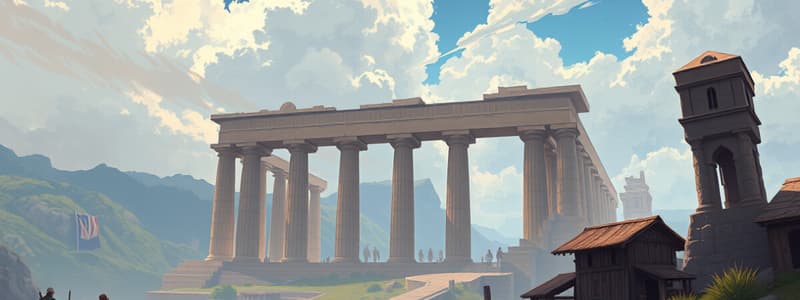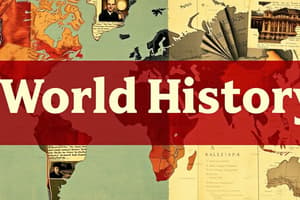Podcast
Questions and Answers
What is one of the primary focuses in the AP World History: Modern exam?
What is one of the primary focuses in the AP World History: Modern exam?
- Understanding contemporary political systems
- Studying economic theories
- Analyzing primary and secondary sources (correct)
- Memorizing key dates in history
How many reasoning processes must students apply for the AP World History exam?
How many reasoning processes must students apply for the AP World History exam?
- Four
- Three (correct)
- One
- Two
What percentage of the exam does the multiple-choice section account for?
What percentage of the exam does the multiple-choice section account for?
- 20%
- 25%
- 50%
- 40% (correct)
Which skill is NOT emphasized in the AP World History exam?
Which skill is NOT emphasized in the AP World History exam?
What is the total duration of the AP World History: Modern exam?
What is the total duration of the AP World History: Modern exam?
What is the exam weighting percentage for the unit 'Revolutions'?
What is the exam weighting percentage for the unit 'Revolutions'?
Which chronological period does the unit 'Globalization' cover?
Which chronological period does the unit 'Globalization' cover?
Which unit has the same exam weighting as 'Land-Based Empires'?
Which unit has the same exam weighting as 'Land-Based Empires'?
What type of questions does the AP exam include?
What type of questions does the AP exam include?
What is the exam weighting percentage for the unit 'Consequences of Industrialization'?
What is the exam weighting percentage for the unit 'Consequences of Industrialization'?
What earns a student 1 point for the thesis/claim component?
What earns a student 1 point for the thesis/claim component?
What constitutes a sufficient contextualization to earn the full point?
What constitutes a sufficient contextualization to earn the full point?
What is necessary to score 2 points in the evidence section?
What is necessary to score 2 points in the evidence section?
What earns a student the full 2 points in analysis and reasoning?
What earns a student the full 2 points in analysis and reasoning?
Which statement accurately reflects common misconceptions about scoring?
Which statement accurately reflects common misconceptions about scoring?
What is assessed by multiple-choice questions regarding the skill of 'Developments and Processes'?
What is assessed by multiple-choice questions regarding the skill of 'Developments and Processes'?
Which historical thinking skill requires analyzing the sourcing and situation of sources?
Which historical thinking skill requires analyzing the sourcing and situation of sources?
What do multiple-choice questions assess regarding the skill of 'Claims and Evidence in Sources'?
What do multiple-choice questions assess regarding the skill of 'Claims and Evidence in Sources'?
Which skill assesses students' ability to identify and describe historical context?
Which skill assesses students' ability to identify and describe historical context?
How do multiple-choice questions assess the skill of 'Making Connections'?
How do multiple-choice questions assess the skill of 'Making Connections'?
What type of questions assess the skill of 'Argumentation'?
What type of questions assess the skill of 'Argumentation'?
Which of the following is NOT assessed through multiple-choice questions according to the skills outlined?
Which of the following is NOT assessed through multiple-choice questions according to the skills outlined?
What does the skill 'Sourcing and Situation' require students to analyze?
What does the skill 'Sourcing and Situation' require students to analyze?
What is the primary focus of the theme 'Humans and the Environment'?
What is the primary focus of the theme 'Humans and the Environment'?
Which aspect is emphasized in the theme 'Cultural Developments and Interactions'?
Which aspect is emphasized in the theme 'Cultural Developments and Interactions'?
In what way does the theme 'Humans and the Environment' illustrate historical trends?
In what way does the theme 'Humans and the Environment' illustrate historical trends?
What implications do cultural developments have according to the course themes?
What implications do cultural developments have according to the course themes?
How do course themes in World History help in understanding historical processes?
How do course themes in World History help in understanding historical processes?
What is one of the historical units covered in the AP World History: Modern course?
What is one of the historical units covered in the AP World History: Modern course?
Which of the following best describes the arrangement of the units in the AP World History: Modern course?
Which of the following best describes the arrangement of the units in the AP World History: Modern course?
Which unit discusses trade and cultural interactions among various regions?
Which unit discusses trade and cultural interactions among various regions?
What types of approaches are encouraged in the study of AP World History: Modern?
What types of approaches are encouraged in the study of AP World History: Modern?
What is a characteristic of the AP World History: Modern course structure?
What is a characteristic of the AP World History: Modern course structure?
What is required for a thesis/claim to earn full points?
What is required for a thesis/claim to earn full points?
What does contextualization require to earn a point?
What does contextualization require to earn a point?
How many points can be earned for evidence from documents, and what is required to earn full points?
How many points can be earned for evidence from documents, and what is required to earn full points?
What constitutes evidence beyond the documents?
What constitutes evidence beyond the documents?
What is necessary for an analysis to earn both points in the analysis and reasoning category?
What is necessary for an analysis to earn both points in the analysis and reasoning category?
What can students do to demonstrate a complex understanding in their analysis?
What can students do to demonstrate a complex understanding in their analysis?
What does it mean to accurately describe the content of a document?
What does it mean to accurately describe the content of a document?
How is the relationship between the documents and the argument relevant in scoring?
How is the relationship between the documents and the argument relevant in scoring?
What is the primary focus of the causation skill in historical reasoning?
What is the primary focus of the causation skill in historical reasoning?
In the context of historical reasoning, what does continuity and change over time involve?
In the context of historical reasoning, what does continuity and change over time involve?
Which of the following best describes the skill of comparison in historical reasoning?
Which of the following best describes the skill of comparison in historical reasoning?
How does the theme of 'Humans and the Environment' relate to historical reasoning?
How does the theme of 'Humans and the Environment' relate to historical reasoning?
Which of the following is NOT a method historians use for causation?
Which of the following is NOT a method historians use for causation?
What characterizes 'Cultural Developments and Interactions' in AP World History?
What characterizes 'Cultural Developments and Interactions' in AP World History?
Which reasoning process focuses specifically on the dynamics over various periods?
Which reasoning process focuses specifically on the dynamics over various periods?
What makes showing evidence of causation challenging for historians?
What makes showing evidence of causation challenging for historians?
Which of the following topics is NOT covered in the study of Land-Based Empires?
Which of the following topics is NOT covered in the study of Land-Based Empires?
Which historical period focuses on nationalism and revolutions?
Which historical period focuses on nationalism and revolutions?
In which historical era is the concept of rationales for imperialism discussed?
In which historical era is the concept of rationales for imperialism discussed?
What is a primary focus of the Cold War and Decolonization era?
What is a primary focus of the Cold War and Decolonization era?
What is a key theme examined in the era of Globalization?
What is a key theme examined in the era of Globalization?
What is the first historical thinking skill students develop in AP World History: Modern?
What is the first historical thinking skill students develop in AP World History: Modern?
Which historical thinking skill involves assessing the significance and limitations of sources?
Which historical thinking skill involves assessing the significance and limitations of sources?
How does the skill of developing an argument manifest in historical analysis?
How does the skill of developing an argument manifest in historical analysis?
Which skill is necessary for connecting different historical developments and recognizing their relationships?
Which skill is necessary for connecting different historical developments and recognizing their relationships?
What does analyzing claims and evidence in sources require students to do?
What does analyzing claims and evidence in sources require students to do?
What is involved in analyzing the context of historical events?
What is involved in analyzing the context of historical events?
Which of the following is a component of developing an argument?
Which of the following is a component of developing an argument?
What do students analyze when using the skill to identify and explain historical developments?
What do students analyze when using the skill to identify and explain historical developments?
Flashcards are hidden until you start studying
Study Notes
AP World History Exam Overview
- Designed to assess historical thinking skills such as analyzing sources and developing arguments.
- Coverage includes multiple historical units, emphasizing specific periods and their significance.
Exam Units and Weighting
- The Global Tapestry (c. 1200-1450): 8-10%
- Networks of Exchange (c. 1200-1450): 12-15%
- Land-Based Empires (c. 1450-1750): 12-15%
- Transoceanic Interconnections (c. 1450-1750): 12-15%
- Revolutions (c. 1750-1900): 12-15%
- Consequences of Industrialization (c. 1750-1900): 12-15%
- Global Conflict (c. 1900-present): 8-10%
- Cold War and Decolonization (c. 1900-present): 8-10%
- Globalization (c. 1900-present): 8-10%
Exam Question Types
- Multiple-Choice Questions: Assess various historical thinking skills (e.g., processes, sourcing).
- Short-Answer Questions: Require identification and explanation of developments.
- Document-Based Questions (DBQ): Involve analysis of sources and construction of arguments.
- Long Essay Questions (LEQ): Demand a historically defensible thesis and deeper analysis.
Historical Thinking Skills
- Developments and Processes: Identify and explain historical changes over time.
- Sourcing and Situation Analysis: Analyze the context, purpose, and audience of sources.
- Claims and Evidence: Evaluate arguments and the evidence behind them.
- Contextualization: Situate developments within a broader historical framework.
- Making Connections: Analyze relationships between historical events through reasoning.
- Argumentation: Formulate and defend a thesis using historical reasoning.
DBQ Scoring Guidelines
- Thesis/Claim: Must present a historically defensible argument.
- Contextualization: Describes the broader historical situation relevant to the question.
- Evidence: Requires the use of specific documents and external information to support claims.
- Analysis and Reasoning: Explores the significance of sources and demonstrates complex understanding.
LEQ Scoring Guidelines
- Thesis/Claim: Presents a well-structured historical argument.
- Contextualization: Explains relevant historical context surrounding the topic.
- Evidence: Identifies and employs appropriate historical examples to support arguments.
- Analysis and Reasoning: Uses logical reasoning to structure arguments and highlight complexity.
Course Themes
- Humans and the Environment: Interaction between societies and their environments.
- Cultural Developments and Interactions: Evolution of beliefs and societal interactions affecting various implications.
Historical Reasoning Processes
- Comparison: Analyze similarities and differences across timelines or regions.
- Causation: Evaluate cause-and-effect relationships in historical events.
- Continuity and Change: Understand patterns over time, assessing what has changed and what has remained constant.
Key Historical Units
- Land-Based Empires: Explore the management, expansion, and cultural dynamics from c. 1450 to c. 1750.
- Transoceanic Interconnections: Examine maritime exploration, technological advancements, and trade.
- Revolutions: Investigate themes of nationalism, industrialization, and their global impact from c. 1750 to c. 1900.
- Global Conflict: Analyze major global conflicts and their consequences from c. 1900 onwards.
- Globalization: Reflect on economic, cultural, and technological changes in a global context since c. 1900.
Studying That Suits You
Use AI to generate personalized quizzes and flashcards to suit your learning preferences.



